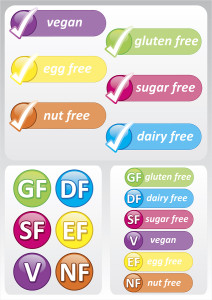Having dinner the other day with a friend of mine, we lamented over the labels that get attached to us over our life span. That morning I had stopped in at a healthy café and ordered a caffeine free chai on coconut milk. Very much taken in by their delicious looking bakery treats I asked if any were egg free. The girl behind the counter said no, and that she was sorry. She then asked me if I was vegan. I said no, I will occasionally eat meat. Cottoning on to the fact that I also ordered a dairy free chai, she said “So you’re a vegan who eats meat!” Ahhh sure, Ok, I guess.

I have never been one for labels. I would purposefully hide my name badge that shouted NATUROPATH when I worked in pharmacy because I found that people just assumed I couldn’t help them with anything other than vitamin C. Thinking about labels made me wonder what irked me so much about them. I have been having a good think and have realised that labels to us, might just be like rear end sniffing for dogs… Wow, that’s an analogy isn’t it?
According to a quick bit of online research, dogs can find out all sorts of information just by having a quick sniff. They can tell the sex of the other dog, whether the dog is in heat, what the dog ate lately and whether the encounter is likely to be friendly. Because each dog has a unique smell, rear end sniffing is the best way for dogs to identify each other. With at least 33 percent of a dog’s brain is designed to process smells, (as opposed to about 5 percent of a human’s brain) a dog’s sense of smell helps it make sense of the world around it.
 In a similar (but less primitive way), people label themselves and other to help with identification, to allow unique pieces of information to stand out as defining characteristics. A simple word such as ‘vegan’ may mean egg free, dairy free, meat free, honey free, and animal products free. It can certainly be easier to say “I’m vegan” than to spout off all your food preferences.
In a similar (but less primitive way), people label themselves and other to help with identification, to allow unique pieces of information to stand out as defining characteristics. A simple word such as ‘vegan’ may mean egg free, dairy free, meat free, honey free, and animal products free. It can certainly be easier to say “I’m vegan” than to spout off all your food preferences.
But I think the problem I have been having with labels is that people make assumptions about the definition of those labels based on their own learning. For example, to one person, a vegan may be someone who doesn’t eat meat, eggs or dairy. To another it may be someone who avoids those foods but also doesn’t wear leather, use beeswax floor polish or keep pets. To the young girl at the café, it was perfectly fine to eat meat, but avoid eggs and dairy and still be a ‘vegan’. I believe there are varying degrees within all labels, it just depends who you talk to.
People change, and labels change with them. Once upon a time, about 10 years ago, I was briefly an aggro vegan. I remember storming out of my parents house one night when I arrived for dinner and Dad decided to serve steak. I went through that phase, and have since enjoyed numerous meat meals at my parents house. But that obviously made a lasting impression because to this day Dad still says, “Oh you won’t want to come up tonight, you’re a vegetarian and we are having meat!”
What I have learnt from the last week, is to be flexible and open with not only my own labels, but with others as well. In consultations when ever I ask people about their diets, I never take it on face value that someone who says they are a vegan, or gluten free, or vegetarian, conforms to my understanding of those words. And I am also endeavouring not to feel annoyed or frustrated, when someone labels me as a naturopath, a nutritionist, or health nut, and decides what I do and don’t eat, believe in, or know. Work in progress. 🙂
Sometimes I think it might just be easier if we were more like dogs… 😉
![]()
No comments yet